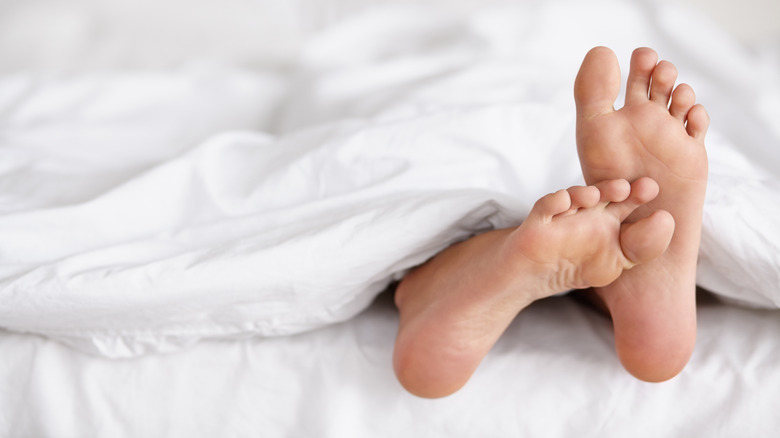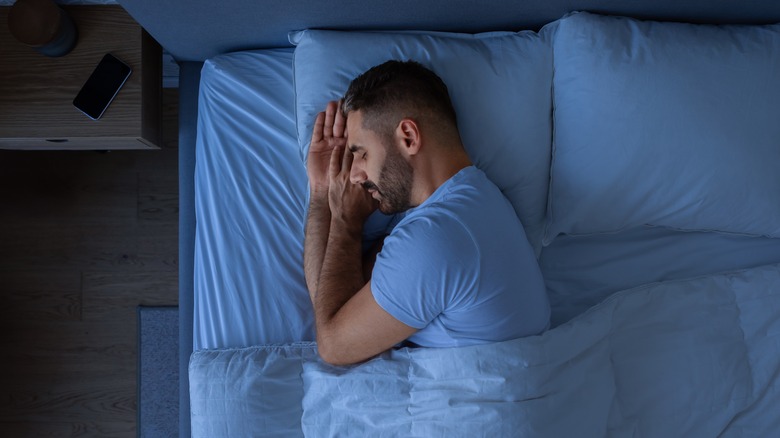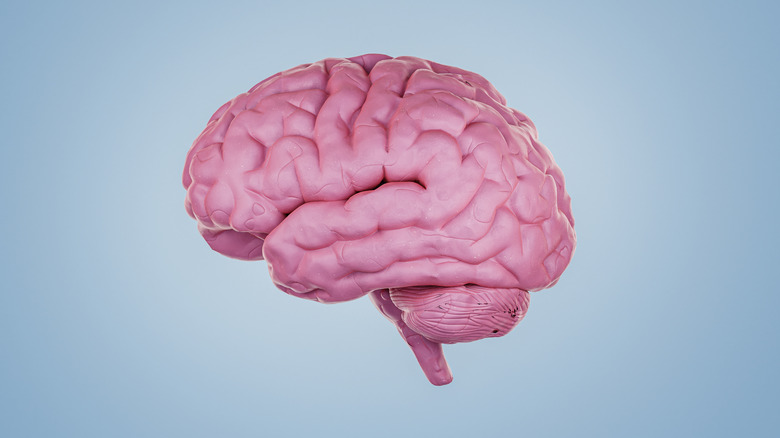The Unexpected Side Effects Of Masturbating Frequently
Let's talk about a topic that is usually tiptoed around because it's considered taboo: masturbation. Often shrouded in unnecessary stigma and treated like a shameful secret, masturbation is a natural and common part of the human experience. Most people masturbate — among the 18 countries surveyed in the 2018 Global Self-Pleasure Report by TENGA, 78% of people practice masturbation. The report also states that "most adults start masturbating at 15 years old and continue doing so throughout their lives."
Many myths and misconceptions surround the matter of masturbation, creating a culture of silence and shame around the subject. But these masturbation myths are more rooted in stigma than science. According to Medical News Today, no research backs up any claims that masturbation can cause infertility, low sperm count, erectile dysfunction (ED), changes in penis size or shape, blindness, physical weakness, or other myths floating around in the ethers. However, masturbating too much can lead to skin irritation or get in the way of daily life or relationships — and if this is happening to you, it's best to seek the support of a therapist or healthcare professional.
Contrary to popular belief, masturbation is not "bad" for you. In fact, it is sometimes seen as a beneficial activity and can come with some unexpected health benefits, including reducing stress, anxiety, and depression; promoting better sleep; boosting self-esteem; and even increasing your sex drive. Let's explore the advantages of frequent masturbation and clear up misunderstandings around this vital aspect of human sexuality.
Masturbation can lead to guilt
Experiencing guilt is a common and unexpected side effect of masturbation, which can be linked to various factors, including social stigma, religious views, culture, trauma, and more. "Feeling guilty after masturbating is often deeply rooted, influenced by cultural messages and internalized beliefs about sex going back to childhood," licensed therapist Megan Ann Corrieri told Choosing Therapy. "The guilt can be very distressing, but exploring where the guilt comes from and developing a healthier self-image can help."
Corrieri explains that some cultures and religions have a negative view of masturbation, which can contribute to feelings of guilt, shame, or fear of committing sins or having bad morals if you masturbate. Depending on your background and upbringing, these beliefs can shape your perspective and relationship with masturbation. Social stigma perpetuates these notions, often portraying personal play as the punchline in movies, TV shows, and everyday conversations. This negative portrayal can lead to feelings of guilt, embarrassment, fear of judgment, or ridicule for engaging in or being caught masturbating. In addition, if you've ever experienced sexual trauma in your life, complicated and unexpected emotions may arise during or after masturbation. Due to the sensitive nature of these feelings, seeking the support of a sex-positive therapist may help.
Masturbating can lower stress and anxiety
Self-pleasure is actually a form of self-care. In a world where stress and anxiety seem to be never-ending, the search for natural ways to chill out and relax is more needed than ever. Solo play is an often overlooked and simple self-care solution to soothing stress and anxiety. According to a 1999 study published in Psychosomatic Medicine, masturbation resulted in an increase in prolactin levels in study participants who identified as women. Prolactin is a hormone in the body that helps us "cope with stress," as mentioned in a 2016 study in Frontiers in Endocrinology.
Researchers have also discovered that sexual activity, including masturbation, helps lower levels of cortisol in the body, which is the hormone associated with stress. This reduction in cortisol can alleviate both feelings of stress and anxiety. In addition, sexual activity can release oxytocin, often called the "love hormone," which further decreases stress levels and promotes overall health and well-being.
Masturbation can reduce depression
Not only does masturbation release oxytocin and prolactin, but it also triggers the release of other hormones in your body, including dopamine — often dubbed the "happiness hormone" — and endorphins, according to Healthline. Endorphins act as a "natural mood elevator," according to a 2016 study published in the Journal of Health and Social Behavior, which emphasized that these feelings of mood upliftment from personal play can be long-lasting and promote overall well-being.
Plus, "sex is one of the most powerful dopamine-releasing activities," licensed psychologist Onur Bal told Healthline. Dopamine is often referred to as the "feel-good hormone" because it boosts mood, joy, and pleasurable feelings in the emotional and mental realms. When dopamine levels are low, individuals may experience symptoms such as sadness, fatigue, apathy, difficulty sleeping, cognitive fog, mood swings, and other related issues. Given its role in regulating mood and emotions, increasing dopamine through activities like masturbation may be a potential solution to naturally boosting mood and happiness.
Masturbating may boost your sex drive
Masturbation works in mysterious ways. While it might seem like masturbating would satisfy all sexual desires, it can sometimes actually increase them. This is likely because masturbating helps you understand your body better, discover erogenous zones, and identify your sexual preferences. Once you learn what you like and don't like in the bedroom, it can make it easier to try to recreate similar actions during sexual activities with a partner and enhance your sexual experience, naturally increasing your desire for more.
The Cleveland Clinic reports that studies show that people who are assigned female at birth (AFAB) who masturbate experience more orgasms and a higher sex drive. Masturbation may also be linked with an increase in vaginal lubricant and decreased pain during sexual activity, which can make sex more enjoyable for those AFAB. Plus, "seeking pleasure from ourselves with ourselves is a really good way to keep those neurochemical and hormonal systems primed," Nan Wise, a cognitive neuroscientist and sex therapist, told GLAMOUR. The act of masturbation activates "the systems that will turn on our appetite for sex."
Masturbation may help relieve pain
Instead of popping an Advil the next time you have a headache, maybe masturbating will cross your mind. Endorphins are hormones released by our body during stimulating activities like singing, dancing, exercise, meditation, and — you guessed it — sex and orgasms. Not only do endorphins help uplift our mood, but they are also considered "natural pain relievers," according to Harvard Health Publishing. In fact, the term "endorphin" is short for "endogenous morphine," which translates to a painkiller naturally made by the human body.
"Masturbating can help relieve anything from cramps and back pain to headaches and joint aches," gynecologist and doctor Sherry Ross told Healthline. Of course, oftentimes, when you're in pain, sexual activity is the last thing on your mind. But it just may help. A 2013 study published in Cephalalgia found that most people avoid sexual activity during headaches, however, those who did participate in sex also experienced some or total relief from migraine or headache symptoms. However, if you're experiencing unknown consistent or chronic pain, instead of taking matters into your own hands, it's a good idea to speak with your doctor to rule out any potential underlying health conditions.
Masturbation can lead to higher self-esteem
Let's face it: masturbation feels good. It can help you feel good about yourself, too. Many of us struggle with stress and anxiety that can stem from negative body image or low self-esteem, which can spill over into our sex lives. This can create a domino effect, further eroding our sexual confidence and causing us to question our abilities in the bedroom. Masturbation offers a safe space to explore your body and sexual preferences in private, without any pressures or outside influences. Exploring yourself alone in this uninhibited way can help you understand who you are and be comfortable with the body you are in.
Self-pleasure can be a form of self-love, as it involves understanding your personal desires and embracing your body with kindness and acceptance. Taking the reins on your own sexual pleasure can feel empowering, reinforcing the notion of control that you have over your own body and choices. A 2015 study published in the Journal of Sex Education and Therapy revealed that masturbation in married people who identified as women experienced a myriad of positive benefits, including more orgasms, increased sexual desire, and higher self-esteem.
Masturbating leads to better sleep
The secret is out — turns out the cliche of falling asleep right after sex might have a scientific explanation. After an orgasm, the flood of "feel-good" hormones like oxytocin and prolactin and the decrease of cortisol create the perfect hormonal cocktail for sleep. It's true — some scientific studies have found that masturbating leads to both better sleep quality and longevity. A 2019 research article published in Frontiers in Public Health found that study participants who had orgasms from masturbation reported better sleep quality, noting that "promoting safe sexual activity before bed may offer a novel behavioral strategy for promoting sleep." In addition, a review of 12 scientific articles concluded that sex before bed may help alleviate insomnia experienced by women-identified individuals due to the stress-relieving effects orgasms have on the body. Something to keep in mind the next time you are tossing and turning in bed!
Masturbation boosts focus and concentration
With countless tasks demanding your attention, taking a break can feel like the least important thing on your agenda. Masturbation may sometimes seem more like procrastination, especially if it's taking up time that you think should be dedicated to school, work, or that massive to-do list. Ultimately, giving yourself that self-pleasure pause could be the most valuable thing you can do. While there isn't much science to back this up (yet), many people report that they experience better focus and concentration after masturbation.
Once again, the mix of hormones released during orgasm, plus their effects on stress and anxiety, can have a positive impact on us — this time, by boosting our brain health. According to Dr. Christopher Asandra, "If the brain's in a more relaxed state physiologically, you'll be able to concentrate better and focus on whatever task is at hand" (per Thrillist). On top of that, the extra boost of blood flow back to the brain after orgasm can promote mental clarity and focus.
Masturbating deceases your risk of STIs
This may seem like a given, but it's worth mentioning: Masturbation can help reduce your risk of sexually transmitted infections, also known as STIs. Personal play is one of the safest styles of sexual activity out there, especially if you're doing it alone. Because you're going solo, there's no chance of anyone getting pregnant and there's no exposure to potential STIs. However, mutual masturbation — which involves masturbating with another person — starts to muddy the waters when it comes to STI risk.
It's possible to get an STI if there are bodily fluids involved or if genitals are rubbing together. If you choose to have sex with another person, safe sex involves using condoms — and while condoms do a great job at STI prevention, they don't protect against all of them. Remember, condoms can't stop the transmission of skin-to-skin contact STIs like herpes, genital warts, syphilis, and monkeypox (as per the Australian Department of Health). Some people can have an STI and not show any symptoms, unknowingly passing it on to someone else. This means that any sexual activity that involves skin-to-skin contact carries a risk of STI exposure.
Masturbation can be healthy for a relationship
The old-fashioned idea that our partner should fulfill all of our needs — sexual and otherwise — is now outdated. Being married and masturbating does not mean your relationship is suddenly doomed for failure. In fact, the 2015 study published in the Journal of Sex Education and Therapy showed that women-identified participants who were married and masturbated reported "greater marital and sexual satisfaction."
Despite the myths, masturbating can be helpful for relationships in many ways. If you are in a monogamous relationship and your partner doesn't want to have sex as much as you do, masturbating can help release some of that sexual tension in a healthy way. Plus, masturbation can boost self-confidence, self-esteem, and sex drive, all of which can positively impact your relationship. However, if your partner is consistently choosing solo play instead of participating in sexual activities with you, it may be an issue and time to visit a therapist or couples counselor.










